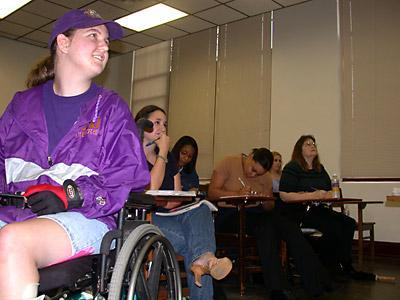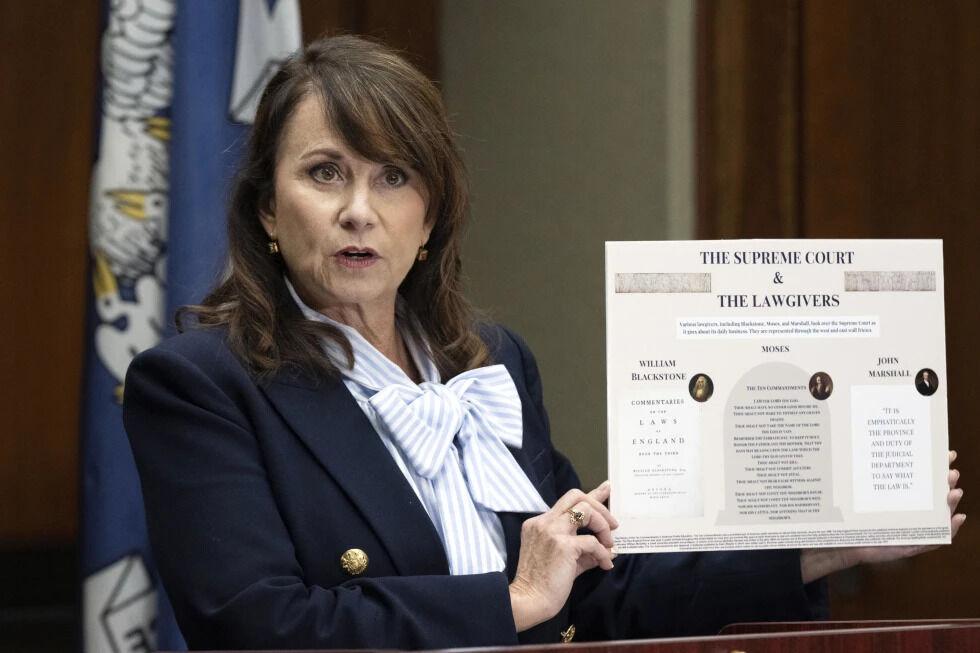Para-educator Mary Turner loves working with the students in her special education middle-school class. She also knows firsthand the hardships they must face every day because of their disabilities.
Turner’s daughter, Amanda, is wheelchair-bound, and the two have fought school systems for years to gain equal access to education.
“It started in elementary school,” Mary Turner said. “Amanda was in kindergarten, and you could only get into her portable classroom by steps. And, there was no handrail.”
Turner sought out Amanda’s principal for an answer, but after getting no results for months, she went to the local school board. Finally, the school board put in a ramp.
“It started all over again when Amanda went to middle school,” Turner said. “She wanted to be in school band, but the band classroom also was portable, and she couldn’t cross the sidewalk to get to it.”
Because Turner worked at the school, she began to request a ramp a full year before Amanda arrived in middle school.
“People need to get started asking questions (about access) way ahead of time to get things done, because it took the whole year to get that one ramp in place,” Turner said.
The Turners faced another challenge Amanda’s eighth-grade year. All of her classes were held on the second floor of the school, and there was no ramp.
“The school board told us there was no money that could be allocated for an elevator or wheelchair lift,” she said. “They were going to try and move all the classes downstairs, then they told us a teacher would help her up the stairs.” (Amanda is able to walk short distances on her own.)
Two years later, the school board installed the lift, and the only student to use it since had a temporary leg injury.
“When the kids needed [the lift], it wasn’t there, and by the time they got it, nobody uses it,” Turner said. “Schools will try everything to get around doing what is right.”
Amanda now is a sophomore at LSU and faces the same problem on a much larger scale.
“When she first came to LSU, Amanda and I walked all over campus, so she would see the best ways to get around the campus,” said Turner. “We focused on little things, like where the sidewalks and curb cuts are so that she could cross the street.”
They found in many cases sidewalks just ended without ramps and many of the curb cuts were far out of the way.
“If you needed to find a ramp, just go past the building, past the bike racks and the dumpsters and that’s where it would be,” she said. “When the sidewalks ended, you could see where they said ‘the money stopped here; that’s all we can do.'”
While Turner feels LSU is better than some of the other schools Amanda looked at in Louisiana, such as McNeese, it has its own share of administrative problems.
“We filled out all the [disability] paperwork we could find when we can for orientation, including the ones for Residential Life,” Turner said. “But, she was still placed in Miller, which isn’t accessible.”
Residential Life tried to place Amanda in Acadian Hall, a compliant dormitory, but when the Turners came to look at the room, there was a problem.
“The rooms are much smaller,” said Turner. “And when she tried to go into the bathroom, we had a heck of a time trying to get her out. She couldn’t get back through the door or even turn around because there was so little space.
“The manager just stood there watching and said, ‘This building is supposed to be compliant,'” she said.
Residential Life finally moved to Amanda to Evangeline Hall, where there is a lift to get the wheelchairs up the stairs.
Turner understands it takes a lot of money to fix disability-access problems but feels if LSU looks hard enough, it can find the money.
“School boards can always find money for stupid projects,” she said. “I’m a [para-educator], and in Louisiana school boards, [getting money] is all about who you know and politics. The only reason my middle school got the chair lift is because our assistant principal had connections and knew who to call. But it still was years too late.”
Turner says she doesn’t want increased taxes more than anyone else, but the Louisiana legislature should try to find a way to address the issue.
“Statewide, they should be able to push money through to deal with the problems,” she said.
Amanda has been the first student with a disability at her elementary, middle and high schools, and her mother says the toughest thing to deal with is knowing even if you fight the system, by the time something is done, the student will have graduated.
“The people who fight for disability access will not be the ones to benefit from it, but the students who follow them will,” said Turner. “You know you’re making it easier for other students to adjust, but it is a hard fact to face yourself.”
Student’s struggles lead to increased awareness
By Jennifer Eck, Contributing Writer
November 21, 2002

JENNIFER SAVARIO / The Reveille
ACCESSIBLE CLASSROOM
ACCESSIBLE CLASSROOM
Student’s struggles lead to increased awareness
More to Discover







